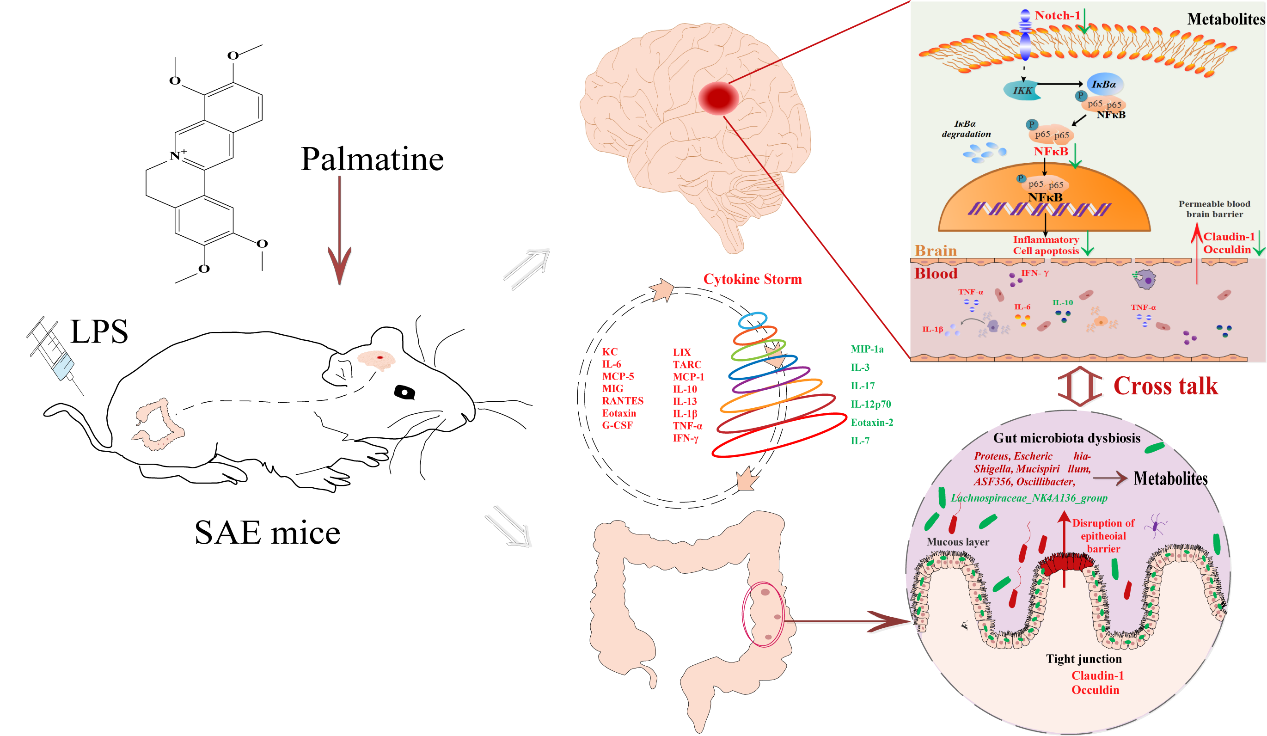Recently, Dr. Wang Ting from the School of Medicine has published a research paper titled “Palmatine Ameliorated Lipopolysaccharide-induced Sepsis-associated Encephalopathy Mice by Regulating the Microbiota-gut-brain Axis” in Phytomedicine (a top journal in the medical category and subcategory of the Chinese Academy of Sciences SCI, IF: 7.9). TU stands out as the primary completing institution, with Dr. Wang Ting serving as the first corresponding author of the paper. Deputy Director Xu Yubin from Taizhou Central Hospital is recognized as the first author.
Sepsis-related encephalopathy (SAE), a common neurological complication associated with sepsis, is prevalent among patients in intensive care units, characterized by high morbidity and mortality rates, posing significant threats to human health. Given the complexity of SAE’s pathogenesis, effective therapeutic solutions, encompassing drugs and treatment methods, remain elusive to date. Palmatine has demonstrated unique efficacy in regulating inflammation and improving sepsis. However, the exact function of palmatine in treating SAE and its underlying mechanisms have yet to be elucidated. This study initiated an assessment of palmatine’s efficacy on SAE in mice through behavioral experiments, survival analysis, histological examination, immunofluorescence staining, and ELISA analysis. It then observed the impact of palmatine on the inflammatory storm in SAE mice using quantitative microchip technology. Further investigation into Notch1/NF-κB signaling pathway was conducted through real-time quantitative PCR and western blotting to analyze the expression of related targets. Lastly, brain tissue metabolomics analysis was utilized to detect differentially expressed metabolites and metabolic pathways, complemented by microbial 16S rRNA analysis and non-targeted metabolomics on fecal samples to identify specific bacterial populations and metabolites associated with SAE. The study aimed to explore the mechanism behind palmatine’s effect on SAE in mice. Results showed that palmatine significantly improved neurofunctional outcomes in mice subjected to LPS-induced SAE, reduced cell apoptosis in the brain tissue, and lowered levels of inflammatory cytokines. Moreover, the study substantiated the potential of palmatine in modulating key components of the Notch1/NF-κB signaling pathway, enhancing expression of tight junction proteins, improving intestinal permeability, promoting the growth of beneficial bacteria (such as the genus Coprococcus NK4A136), inhibiting proliferation of harmful bacteria (such as Escherichia-Shigella species), alleviating metabolic dysregulation, and confirming its therapeutic efficacy in SAE treatment. This research validates the effectiveness of palmatine in treating SAE, laying a solid foundation for further exploration into SAE therapy and advancements in palmatine research.

This research was supported by projects funded by the National Natural Science Foundation of China (Grant No. 82374008), Zhejiang Province’s Medical and Health Science and Technology Program (Grant No. 2024KY1823), and other relevant initiatives.
Full text link:https://www.sciencedirect.com/science/article/pii/S0944711323006657?via%3Dihub